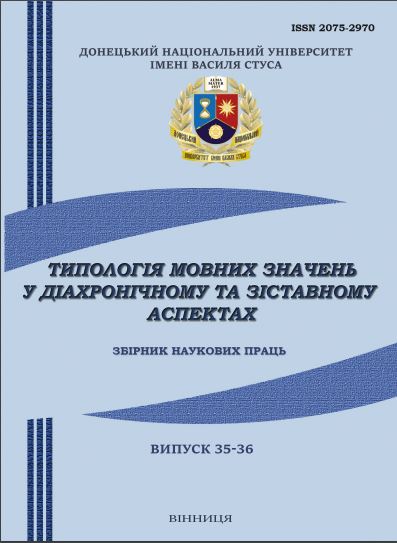Causative Constructions with the Semantic Meaning of Emotional State in the English and the Ukrainian Languages.
DOI:
https://doi.org/10.31558/2075-2970.2018.35-36.5Keywords:
causativity, causative construction, causative situation, emotivity, positive / negative emotions, neutral emotionsAbstract
The article is devoted to the comparative research of the causative constructions with the semantic meaning of emotional state. The research is based on the examples of the English (to amaze smb with smth) and the Ukrainian (вражати кого-небудь чим-небудь) constructions, the verbs of the emotional state as a part of the causative constructions. The relevance of the article is determined by the necessity of systematic semantic analysis of the causative constructions denoting emotional state. The subject of the research is the semantics and the structure of causative constructions in the English and the Ukrainian languages. The aim of the research lies in carrying out the semantic analysis of causative constructions and revealing the common and the different features in both languages. The classification of causative verbs with the semantic meaning of emotional state has been shown and the difference between the notions ‘emotionality’ and ‘emotivity’ has been determined. In the given article the frequency percentage of constructions with the semantic meaning of positive and negative states has been defined, and it is based on the examples from the English and the Ukrainian belles-lettres texts.References
Арутюнова Н. Д. Предложение и его смысл: Логико-семантические проблемы [6-е изд.]. М. : УРСС, 2009. 383 с.
Апресян В. Ю. Семантика эмоциональных каузативов: статус каузативного компонента: НИУ Высшая школа экономика, Москва, Россия, 2013. С. 44–57.
Довгаль А. В. Семантические особенности глаголов со значениями ‘эмоциональное состояние’ и ‘эмоциональное отношение’: Acta Germano- Slavics VI, 2015. С. 48–52.
Залужна О. О. Привативні дієслова в англійській та українській мовах : дис. … на здобуття ст. канд. філол. наук : 10.02.17. Донецьк, 2014. 283 с.
Золотова Г. А. Очерк функционального синтаксиса русского языка / [2-е изд., испр. М. : УРСС, 2005. 351 с.
Киричок Е. А. Глаголы каузации положительного эмоционального состояния в немецком, французском, английском, русском языках, Studia Germanica et Romanica : Іноземні мови. Зарубіжна література. Методика викладання: науковий журнал / голов. ред. В. Д. Каліущенко. Донецьк : ДонНУ, 2013. Т. 10 № 2(29). 156 с.
Корди Е. Е. Модальные и каузативные глаголы в современном французском языке. М. : УРСС, 2004. 168 с.
Кузнецова М. В. Каузативность как одна из центральных категорий глагола // Вопросы глагольной семантики: [сб. науч. тр. / ред. Е. Н. Сидоренко]. Симферополь : СГУ, 1993. С. 47–52.
Кучман І. М. Особливості перекладу англійських каузативних конструкцій // Науковий вісник Ужгородського університету. 2012. С. 1–2.
Левицкий Ю. А. Основы теории синтаксиса : учеб. пособие по спецкурсу. М.: УРСС, 2002. 236 с.
Недялков В. П. О связи каузативности и пассивности // Вопросы общего и романогерманского языкознания : доклады и сообщения / [отв. ред. Ю. М. Скребнев]. Уфа : Башкирск. книжн. изд-во, 1964. С. 301–310.
Сильницкий Г. Г. Семантические и валентностные классы английских каузативных глаголов : автореф. дис. на соискание уч. степени д-ра филол. наук : спец. 10.02.04 «Германские языки, 1974. 43 с.
Теньер Л. Основы структурного синтаксиса. М. : Прогресс, 1988. 653 с.
Типология каузативных конструкций (морфологический каузатив) / под ред. А. А. Холодовича. Ленинград: Издательство ‘Наука’, Ленинградское отделение, 1969. 312 с.
Kulikov, L. I. (1993) Through the Looking-glass, and How Causatives Look There / L. I. Kulikov, N. R. Sumbatova // Causatives and Transitivity / [B. Comrie, M. Polinsky (eds.)]. Amsterdam, Philadelphia: John Benjamins. P. 327–342.
Shibatani, M. (2002) Some Basic Issues in the Grammar of Causation The Grammar of Causation and Interpersonal Manipulation / [M. Shibatani (ed.)]. Amsterdam : John Benjamins. P. 1–22.
Song, J. J. (1996) Causatives and Causation: A Universal Typological Perspective. London : Longman. 295 p.
Багряний І. П. Сад Гетсиманський [Електронний ресурс]. URL: http://ukrbooks.com/ ua/sad_getsymanskyj/
Барка В. Жовтий князь [Електронний ресурс]. URL: https://www.ukrlib.com.ua/books/ printit.php?tid=49
Гончар О. Твоя зоря [Електронний ресурс]. URL: http://ukrclassic.com.ua/katalog/gg/ gonchar-oles/148-oles-gonchar-tvoya-zorya
Нечуй-Левицький І. Кайдашева сім’я [Електронний ресурс]. URL: https://www.ukrlib.com.ua/books/printit.php?tid=907
Capote, Truman. (1958) Breakfast at Tiffany's: A Short Novel and Three Stories. New York: Random House. 178 p.
Christie, A. (2008) At Bertram’s Hotel: Книга для чтения на английском языке. СПб. : КАРО. 352 с.
Hailey, A. (2012) Hotel: Книга для чтения на английском языке (Серия «Modern Prose»). СПб. : Антология, КАРО. 480 с.
Orwell, G. (2015) 1984 : Книга для чтения на английском языке. Санкт-Петербург : КАРО. 384 с.
Weisberger, L. (2006) The Devil Wears Prada. Harper Collins Publishers. 391 p.

